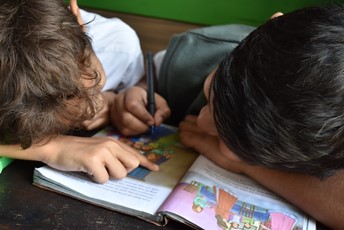Dayami Rodriguez is the owner and Director of Royal Palm Montessori Academy. Holding degrees from prestigious institutions like Harvard University and Nova University, Rodrigeuz is also a certified Montessori teacher. With over two decades of commitment, she has crafted a nurturing Montessori Program, fostering the holistic development of preschool children. In the following article, Dayami Rodriguez discusses how in a globalized world, early exposure to foreign languages is proving to be more valuable than ever, introducing cognitive and cultural benefits that arise from embracing bilingual beginnings.
In today's cross-border society, bilingual brains are true assets, opening countless doors of opportunity. And there's nobody more primed to rapidly pick up a language than children, with an
MIT study showing those who actively learn/are immersed in a language prior to age ten have a far better chance of achieving native proficiency. A bilingual beginning is something that every child can benefit from.
Dayami Rodriguez explains that early exposure to foreign languages not only has the power to aid their goals and make travelling much easier, but it also has cognitive and social function advantages that may ease the otherwise-tumultuous sides of life. From enhancing problem-solving skills to increased confidence to greater cultural awareness and beyond, learning a second language should be promoted as early as preschool in order to effectively reap the complete rewards.
Dayami Rodriguez on the Greater Cultural Awareness
The world is a huge place with a lot to learn. Understanding multiple languages can be one of the best ways to elicit excitement and interest about other cultures, their ways of life, and their traditions. And with being able to fluently speak multiple languages comes the ability to better perceive intentions and understand the messages of different cultures effortlessly.
Through bilingual lenses, children will uncover secrets about the planet that would otherwise remain hidden from them, such as regional dialects in foreign languages, cultural idioms, slang terms, and much more. Regardless of the specific tongue, they'll expand their worldview and construct a nuanced understanding of everyone they encounter.
Enhanced Problem-Solving Skills
Early second language learners hold more robust executive function that their monolingual classmates, ensuring that they're better at focusing, planning, and achieving their goals. Multitasking and critical thinking also improve, with
some research suggesting that bilingual individuals have more creativity than others.
Dayami Rodriguez notes that, upon receiving a more complex task, those with at least two languages under their belt tend to be much better at solving it — a highly necessary skill throughout adult life.
Boosted Social Understanding and Empathy
Children can learn languages incredibly quickly, but that doesn't mean they will do so without error. In fact, those at
Rosetta Stone note that they'll make a seemingly limitless number of errors. However, it's this initially flawed perspective that will work wonders for enhancing their emotional maturity, bringing empathy along with it.
Understanding the struggle of learning a new language allows them to empathize more thoroughly with others when any obstacles appear, as reported by various studies.
Dayami Rodriguez of Royal Palm Montessori Academy says that in a 2013 paper published in Learning Landscapes Journal, bilingual children purportedly demonstrated empathy better than their monolingual classmates. Namely, these children were advanced in understanding other:
- Perspectives
- Thoughts
- Intentions
- Desires
- Tone of Voice
According to Oren Boxer, Ph.D., neuropsychologist and a BumoBrain advisor, this increased strength is due to their unhindered detection of nuanced communication features, like prosody (i.e., speech's rhythm and tone). Dayami Rodriguez of Royal Palm Montessori Academy reports that various hypotheses suggest that a bilingual beginning is considerably different from the monolingual experience, facilitating a more robust understanding of others' perspectives.
 Increased Confidence
Increased Confidence
Learning another language during childhood boosts individuals' confidence, as they can use the other language in order to express themselves in different ways. Communicating with more fluency and negating the need to request parental assistance have proven to be two more self-esteem-growing benefits.
Dayami Rodriguez adds that proficiency breeds empowerment, encouraging them to try out their new skills without feeling fearful of shame.
Advanced Memory Skills
Dayami Rodriguez of Royal Palm Montessori Academy notes that the human brain is exceptional, being capable of storing remarkably vast amounts of information. Whether it's memorizing the names and faces of individuals it's only just met or hundreds of books’ worth of content, its cognitive function is phenomenal. Despite this, many aren't given the chance to construct stronger neural connections between both hemispheres.
Adults hoping to prevent the above unfortunate occurrence should expose their children to foreign languages from the get-go. Unbeknownst to them, this decision will develop hardier neural links, leading to better overall memory.
As they age, they won't just be awarded with the superpower of bilingualism; they'll be able to remember things in their day-to-day lives more easily without needing to rely so heavily on lists and reminders.
Facilitating Bilingualism from the Start
Dayami Rodriguez of Royal Palm Montessori Academy explains that parents can facilitate early second language learning in many different ways, but the best way would be by carefully selecting the school they go to. Establishments that implement
foreign language classes as a part of their regular curriculum are the best option, effectively immersing young minds in the glorious nature of diverse cultures and languages.
 Increased Confidence
Increased Confidence